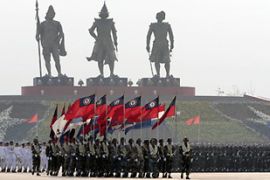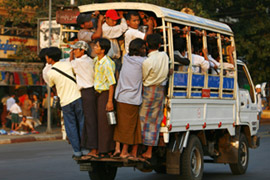Myanmar to put activists on trial
More than 50 people have been arrested over fuel-price protests.

Among those held is Min Ko Nain, the country’s most prominent political leader after democracy icon Aung San Suu Kyi.
| Myanmar fuel protests |
The papers did not say when or where trials would be held.
In addition to the 13 leaders, nearly 40 people were detained for staging protest marches through Yangon, a city of 5 million whose bus network was brought to a standstill this month by a 100 per cent hike in fuel prices at state-owned petrol stations.
The arrests were part of a major crackdown by the government, which tolerates virtually no dissent, on a series of small but defiant protests against the soaring fuel costs and deteriorating living standards.
Yangon was quiet on Saturday, with pro-government Union Solidarity and Development Association members and plainclothes police deployed throughout the city to prevent further protests. Lorries stood ready to take demonstrators away.
Nyan Win, a spokesman for the opposition National League for Democracy party, said on Saturday that eight demonstrators detained on Wednesday had been released, but that the fate of the others was unknown.
Peaceful protests have been taking place since Sunday, mainly in Yangon.
Partial victory
The protests were quickly broken up on Friday, but the demonstrators could claim a partial victory after the government ordered some bus companies to lower fares that were raised because of the higher fuel prices.
 |
| The government has ordered some bus companies to lower fares [GALLO/GETTY] |
Despite their determination, analysts say ordinary people are probably too scared to get involved, which suggested a repeat of the 1988 mass uprising of students, monks and civil servants is unlikely.
As many as 3,000 people are thought to have been killed in the military’s suppression of the unrest.
Since then, most civil servants have been moved to a distant new capital and university campuses relocated to Yangon’s outskirts – tactics possibly designed to counter any future unrest, Myanmar exile groups in Thailand say.
The world’s largest rice exporter when it won independence from Britain in 1948, Myanmar is now one of Asia’s poorest countries after more than four decades of unbroken military rule.
Suu Kyi, whose National League for Democracy party won a 1990 landslide election victory only to be denied power by the army, has spent most of the 17 years since in prison or under house arrest.
